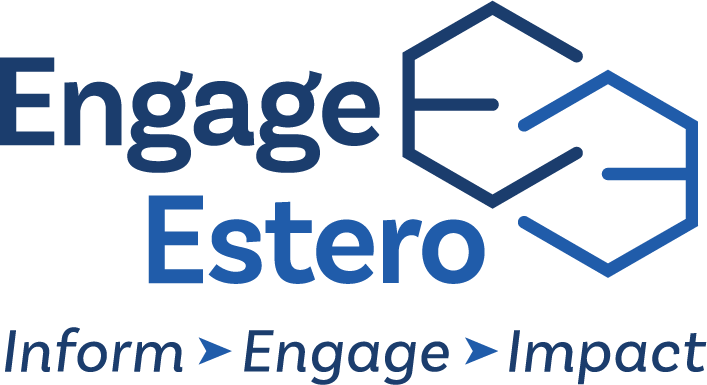Estero Fire Rescue, San Carlos Park Fire Protection and Rescue Service, and Bonita Springs Fire Control & Rescue District have an agreement for “Closest Unit Response”. This means if an Estero Fire Rescue unit is closer to an incident call in the Vines, they will...

Few people, outside of the local, county, and state government agencies, understand “Development Impact” fees. The ECCL monitors impact fees, and their use in Estero and surrounding communities. The following information will help you understand what they are, how they are calculated, what they can be used for, and who sets the rates. Knowledgeable people are influential people.
What Are Impact Fees and Why Are They Needed?
The American Planning Association (APA) provides insight to Impact fees, “Impact fees are payments required by local governments of new development to provide new or expanded public capital facilities required to serve that development. They are used to finance improvements offsite (Roads, Schools, Parks, Fire/EMS) but to the benefit of the development.”
The APA confirms, “Local governments throughout the country are increasingly using impact fees to shift more of the costs of financing public facilities from the general taxpayer to the beneficiaries of those new facilities. The fees supplement local government resources that otherwise have decreased because of diminished state and federal transfers of funds. Local governments have also used impact fees to delay or as a substitute for general property tax increases.”
The APA found, “state court involvement in the review of these fees require a ‘rational nexus’ between the fee and the needs created by development and the benefits incurred by the development. An example is Lee County using resident communities Wild Blue, The Place, and Verdana road impact fees to widen Corkscrew Road. “The standard requires that the fee be ‘specifically and uniquely attributable’ to the needs created by new development, and the relaxed standard that the fee is ‘reasonably related’ to the needs created by the development.”
Finally, the APA analysis found, “Many local communities have expanded the use of impact fees to finance a wide variety of public facilities. The most widespread use of these fees is for sewer and water facilities, parks, and roads. Impact fees are also used for schools, libraries, and public facilities.”
How Are the Fees Calculated?
Lee County Commissioners set the base fee and collection percentage for unincorporated Lee County in March 2018, and the unanimously approved ordinance is in effect for five years. The Commissioners approved a 2.5% escalation rate per year from 45% to 55% over the five years. If the county Commissioners do not approve additional ordinances, they revert to 100% collection in March 2023.
For What Can They Be Used?
For example, single-family home fees include:
- Roads (Unincorporated Lee County)– base fee $9,996, collection rate 3/7/2020 (50%) equals $4,998.
- Each municipality can set the road’s impact fee percentage. The Village of Estero and Bonita Springs sets their percentage at 100%.
- Schools – base fee $5,484, collection rate 3/7/2020 (50%) equals $2,742 (all of Lee County)
- The school district requests the collection rate, and the County Commissioners approve the rate.
- Parks – (Unincorporated Lee County) base fee $1,535, collection rate 3/7/2020 (50%) equals $768
- Fire/EMS – base rate $821, collection rate (100%) equals $821. This rate is the maximum rate the fire districts can charge, and most charge the maximum.

You can find the authority for impact fees here.
Who Sets the Rates?
Lee County manages the fees for unincorporated Lee County areas. The Village of Estero and Bonita Springs codify impact fees in their Land Development Code.
Because there are different uses for land, from different types of homes to retail and commercial buildings, to calculate each impact fee, there are multiple rates:
- Lee County funds the Lee County Sheriff through the Lee County general fund budget. The Village of Estero contracts out for Sheriff services.
- Lee County Water and Sewer is funded through monthly fees to the user. A portion of these fees is reserved in an enterprise fund for improvements, upgrades, and expansion of capability. The developer pays for connection to the existing facilities and the expansion of current piping capabilities if required.
- Property taxes fund Lee County Libraries.
Proportionate Share Program
The State and County also use the “Proportionate Share Program” at their discretion. There is a statutory basis for the program in Section 163.3180 of the Florida Statutes.
Currently, Lee County uses the “Proportionate Share Program” only for roads. County management stated, “Proportionate Share was never intended to make up the difference between assessed impact fees and 100% impact fees. Proportionate Share is one of several funding sources to upgrade roads”:
- Gas tax (which is flat and projected to decrease with more electric vehicles)
- Proportionate Share (negotiated for each new development, with restrictions, and must be used in the general area)
- Road Impact fees (restrictions and must be used in the general area)
- General fund
- Unused tolls
In areas where homeowners can afford the higher impact fees, the County Commission can use Proportionate Share to help fund road improvements. In our area of Lee County, specifically in the East Corkscrew area, proportionate share rates were negotiated with Wild Blue ($1600 per home), The Place ($1600 per household), and Verdana (flat contribution of $4.8M).

Another one of Lee County’s challenges is providing affordable workforce housing. While some areas in Lee County can afford the 100% impact fees when homeowners purchase a new home – many of the neighborhoods in Bonita Springs, San Carlos Park, Lehigh Acres, North Ft. Myers, etc. cannot afford the 100% impact fees. It is always a challenge for our elected officials to fund development infrastructure to ensure that all who benefit pay their fair share.
We hope you found the explanation of impact fees informative. However, we also hope you find it useful as the more informed we are, the stronger our voice.
Mark Novitski
ECCL
Chief Operating Officer











